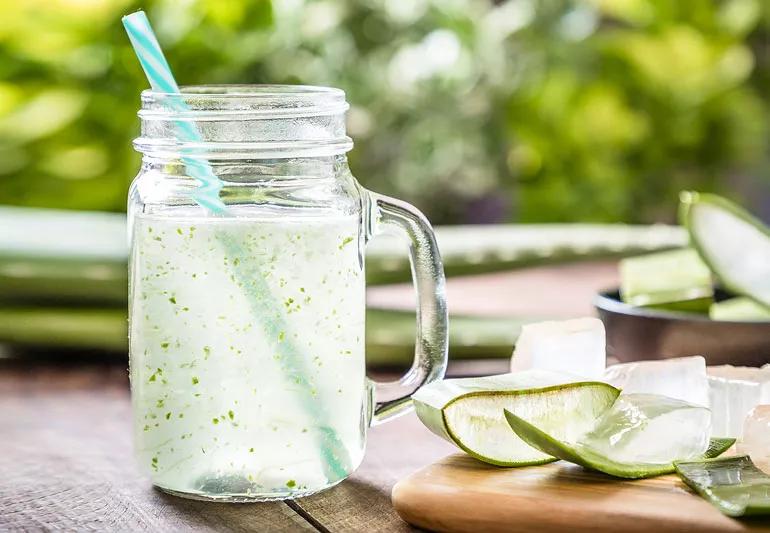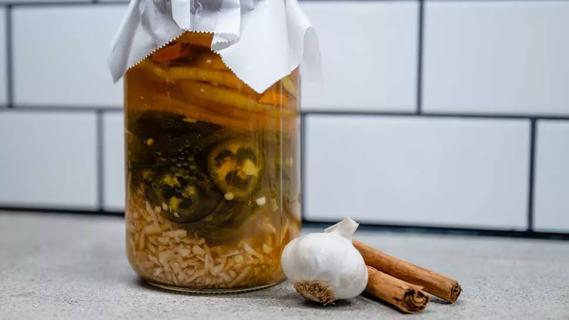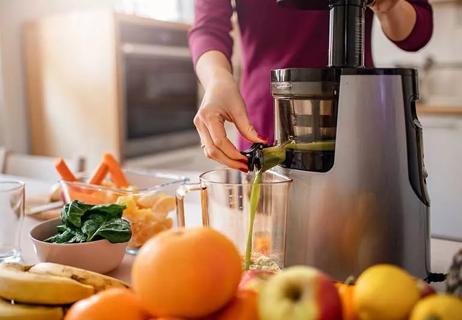6 boosts of this low-calorie, low-sugar drink

Aloe vera is known for being one of the best ways to soothe a sunburn. In gel form, the gooey, sticky substance feels like a cool balm on your hot skin.
Advertisement
Cleveland Clinic is a non-profit academic medical center. Advertising on our site helps support our mission. We do not endorse non-Cleveland Clinic products or services. Policy
But that’s not aloe’s only superpower. “Aloe is an unassuming plant,” says registered dietitian Beth Czerwony, RD, LD. “It doesn’t really look like it’s all that special. But it can actually provide a lot of benefits.”
Believe it or not, drinking aloe vera juice is one of the best ways to reap health benefits from the plant.
Making aloe vera juice is a very simple process.
Start by plucking several leaves off healthy, mature aloe vera plants. Think of these like pillows — only instead of down or feathers, the leaves are a cushion filled with gel.
Next, carefully cut into the leaves. Extract the gel you see and mix it with water. Presto — you now have tasty aloe vera juice to sip.
That this simple drink offers so many health benefits might be difficult to believe. But Czerwony notes that its simplicity is a plus. Unlike aloe vera-based lotions, the impact of aloe vera juice isn’t diluted by chemicals, fragrances or other substances.
“The aloe vera juice itself is much more potent,” she says. “If we’re looking at properties, you’re going to get more bang for your buck from the juice than if you use it as a topical.”
Aloe vera juice first and foremost contains antioxidants, or substances that help reduce your chances of developing conditions such as diabetes and heart disease. But aloe vera juice offers benefits beyond just prevention.
Advertisement
Regular juices aren’t always healthy. Not all of them have a high percentage of real fruit in them, for starters. Many also have added sugar — and lots of it. Aloe vera juice, however, is a healthy option. Czerwony says an eight-ounce serving isn’t high in protein, fat or carbs, but has only eight calories and is low in sugar. “It’s pretty neutral,” Czerwony notes. “You can drink it on its own, or you can put it in your smoothies.”
It may seem counterintuitive, but you often develop acne because you’re dehydrated. As a result, your skin produces more oil, which leads to acne breakouts. “If you’re drinking aloe vera juice, you’re going to get hydrated,” says Czerwony. “That’s going to give your skin extra moisture, and so you’re going to have less chance of having acne.”
If you’re constipated, good news. Aloe vera juice’s texture can affect the consistency of your poop, specifically by making it softer.
Heartburn occurs when acid in your stomach travels up into your esophagus. The results of a small 2015 study showed that aloe vera juice can alleviate some of the acid in your stomach that brings on heartburn.
Aloe vera juice is packed full of beta carotene, an antioxidant typically found in orange and yellow vegetables and fruits. Your body converts beta carotene to vitamin A, a vitamin linked to overall eye health.
Aloe vera juice contains vitamin C — a versatile vitamin that helps with immune function, for example — as well as calcium and magnesium. “Many people having muscle aches are often low in calcium and magnesium,” says Czerwony. “Drinking aloe vera juice could replenish these if your diet is low in them.”
As with anything delicious, be careful not to overdo it. Czerwony says a cup of aloe vera juice a day is a good limit. “Drinking more is not going to necessarily give you more benefits,” she says.
She also recommends drinking a smaller amount of aloe vera juice at first to see how your body tolerates it. “Anytime there’s a sudden change in your diet, your body is going to say, ‘What’s going on?’” Czerwony notes. “You want to start off slow because you really don’t know how the body is going to respond to aloe vera juice.”
Once you decide to start drinking aloe vera juice, you should also decide why you’re taking that step. “What’s the end result you’re hoping for? Some people want to be healthy, but what does that mean?” Czerwony asks. “Some people say, ‘Hey, it’s full of antioxidants. It has vitamin C, vitamin A, beta carotene and all kinds of good stuff. I want that in my diet.’ OK, that makes sense.”
Advertisement
Czerwony says aloe vera juice is safe to drink every day. But drinking too much of it can cause cramping or diarrhea. This in turn can bring on an electrolyte imbalance. “If you have some of those gastrointestinal symptoms, you should probably drink aloe vera juice every other day, or every third day,” she says.
If you’re introducing aloe vera juice into your diet, it’s a good idea to check in with yourself and track how you’re feeling once you start. “If you’re taking it every day for weeks, and you’re not seeing any benefit, then don’t do it,” Czerwony says. “Don’t put extra things in your body if it’s not going to benefit you.”
Above all, consulting with your doctor before making any drastic diet changes is also always a good idea. “Anytime that you try something different, let your doctor know,” Czerwony advises. “If you have sudden abdominal cramps and don’t know why, it could be the aloe vera juice. You may not even realize that’s what it is. But if your doctor knows you changed your diet, they can tell you to stop.
“People think if something’s natural that you can have as much of it as you want,” she adds. “I always tell people that just because something is natural doesn’t mean that it couldn’t have harmful side effects.”
Advertisement
Learn more about our editorial process.
Advertisement

Options for sober social drinking are abundant, but be mindful about additives and triggers

Pickle juice has a reputation as a probiotic powerhouse, workout recovery aid, hangover cure and more

If you’re looking to boost your gut health, it’s better to get fiber from whole foods

While it isn’t bad for you, celery juice isn’t the detox phenom it’s claimed to be

Regularly drinking these sugar-fueled, stimulant-laden beverages can increase your risk of adverse health effects

This spicy concoction can do more harm than good, upsetting your stomach and causing painful acid reflux

Juicing removes beneficial fiber from fruits and veggies and raises your blood sugar

Sports drinks can give your body a boost, but it’s important not to overuse them

Wearing a scarf, adjusting your outdoor activities and following your asthma treatment plan can help limit breathing problems

Your diet in the weeks, days and hours ahead of your race can power you to the finish line

When someone guilt trips you, they’re using emotionally manipulative behavior to try to get you to act a certain way